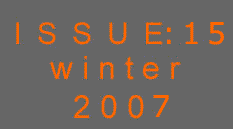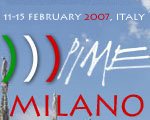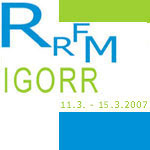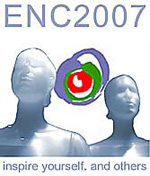
Eurobarometer Survey on Energy Technologies: a mixed
bag of results for the nuclear industry
At the beginning of January, the European Commission
published the results of a Eurobarometer
public opinion survey that it carried out last year among EU citizens
on the subject of energy technologies. ENS NEWS
has carried out a detailed analysis of the survey results for
its readers and outlined (see below) the most salient statistics,
including data on EU citizens’ general awareness of issues
relating to nuclear and other energy sources and their views on
research, fusion etc.
The results are a bit like the proverbial curate’s
egg – good in some parts. And, of course, opinion polling
is not a precise science, with statistics always subject to varying
interpretations. So, you should draw your own conclusions. However,
these extensive EU-wide surveys can reveal useful information
about what EU citizens know and feel about key issues of the day.
It is important to bear in mind that the survey
was carried out between May and June 2006, just after the Chernobyl
accident’s 20th anniversary, and negative publicity
could have influenced respondents’ views. Furthermore, the
survey was carried out in the EU-25 and does not include the two
new comers, Bulgaria and Romania - two nuclear countries where
public opinion is very much in favour of nuclear energy. However
one chooses to interpret the results, it cannot be denied that
they certainly give food for thought.
Summary of the main findings:
-
Energy related issues seem to be
of secondary importance when compared to wider societal or
economic issues. The Eurobarometer on
Energy Technology confirms that energy is not a major
concern or a top priority for EU citizens. It is a “back
of mind issue”. When the major social issues of the
day are considered as a whole, EU citizens rate energy issues
(14%) far below unemployment (64%), crime (36%) and healthcare
systems (30%). Clearly, issues that relate more directly to
daily life, economic well-being, safety and health (p.9) are
seen as priorities by most EU citizens. However, other public
opinion surveys on energy issues have tended to show that
views can evolve quickly (see Info Pool/Public Opinions
section of FORATOM’s web site:
www.foratom.org).
-
Only 1 in 5 citizens support the
use of nuclear power (p.33). The percentage of people
in favour of nuclear energy (20%) has decreased compared to
that registered in the last Eurobarometer on Radioactive
Waste, which was published in June 2005 (37%). However,
only 37% of the interviewees are now clearly against it, which
shows a decrease of around 20% (55% in the June 2005 Eurobarometer,
p.26). Consequently, there is a greater proportion of respondents
that are non-committal.
-
Looking thirty years ahead, Europeans anticipate
a fundamental swing towards the use of renewable energies.
The survey reveals that European citizens now rank nuclear
energy as likely to be the third “most used” energy
source in 30 years time - after solar (49%) and wind (40%).
Nuclear energy is, therefore, expected to be a substantial
part of the energy mix in the future (p.34-38). Four
years ago, when the Eurobarometer on Energy was published,
only 6% of EU citizens expected nuclear to be part of the
energy mix in 20 years (p. 73, Eurobarometer, Energy: Issues,
Options and technologies, December 2002).
-
In citizens’
minds, energy is most often associated with high prices.
A third (33%) of Europeans spontaneously relate energy issues
to prices and 45% consider that their government should make
guaranteeing low energy prices a top priority in their energy
policy (p.13-15). A majority of EU citizens also think
that their country is significantly dependent upon imported
energy. 61% think that their country is dependent
upon energy imports. This degree of dependency falls to 53%
when respondents are asked to consider overall EU dependency
levels (p.20-21). Of course, these are issues where nuclear
power can contribute to finding the solution.
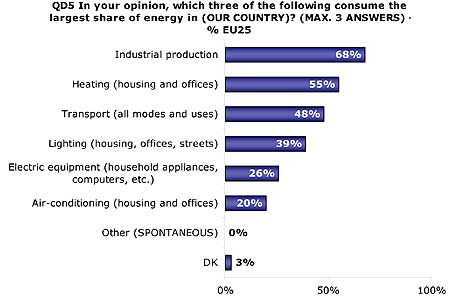
-
It is worth noting that in Sweden
30% of respondents think about nuclear power first where energy
issues are concerned. The current debate about the
phasing-out of nuclear power probably explains this trend.
In 1980, the government decided to phase-out nuclear power
after a referendum, but today nuclear power supplies half
of the country’s electricity needs and a majority of
Swedes are in favour of it. An opinion poll published in June
2006, which was commissioned by the Swedish Nuclear Safety
and Training Centre (KSU) and conducted by the polling organisation
TEMO, shows that public support for continuing to use nuclear
power remains strong at 85%. The phase-out policy is, therefore,
not in concert with the views of a majority of Swedes.
-
Over half of EU citizens have heard
of nuclear fusion (58%). The countries where the
share of those knowing about fusion is the largest are: Sweden
(99%), The Netherlands (86%), Denmark (72%), Germany (71%),
France and Finland (69%) - (p. 12-13)
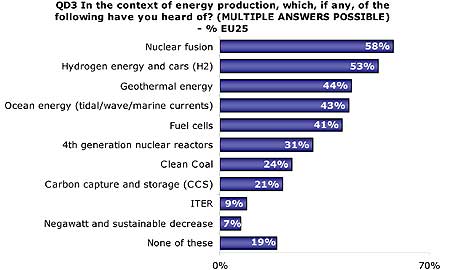
-
EU citizens are quite well aware
of the fact that nuclear power is one of the main energy sources
in many European countries. Nuclear power (36%) ranks
third among the most used energy sources, according to those
surveyed, after oil (81%) and coal (77%). However, their views
are not completely accurate. In countries where nuclear power
is the main source of energy, like France and Lithuania, it
is still only the third most chosen answer (78% in France
and 49% in Lithuania). (p.18-19)
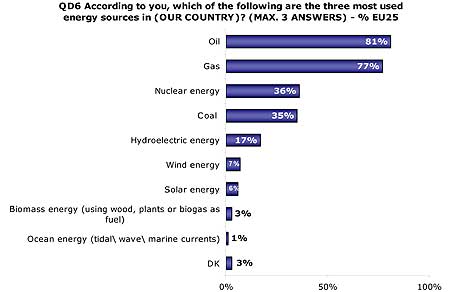
-
Scientists top the credibility league:
a majority of EU citizens consider scientists (71%) and environmental
protection organisations (64%) to be the most trustworthy
sources of accurate and useful information on energy issues.
Energy companies rank fifth in the list (35%) ahead of journalists
(31%) and national governments (29%) (p 24).
-
EU citizens attach considerable importance
to energy-related research. 66% consider that it
is a high priority and only a small amount of respondents
considered research to be unimportant.
Readers can study the survey’s findings in more depth at
the following web link:
ec.europa.eu/public_opinion/archives/ebs/ebs_262_en.pdf |

